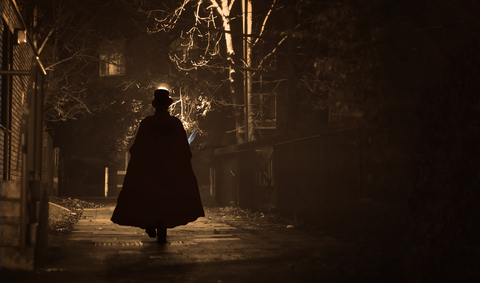Frederick Porter Wensley, Jack the Ripper, and Why You Never Want to be Second on the Stair Tower
One of my favorite books on criminal investigations is nearly a century old. 40 YEARS OF SCOTLAND YARD was published in 1931 by Chief Constable Frederick Porter Wensley. I found an original hardcover in the back of a dusty used bookstore. I can’t recall how much I paid for it, but it wasn’t much.
During his life, Wensley was celebrated for being the most highly-decorated detective in Scotland Yard’s history. He achieved rank and royal titles but in terms of contributions to modern day law enforcement, there’s not much. His methods aren’t taught in police academies. He didn’t pioneer any forensic breakthroughs.
As far as I can tell, Wensley held the thin blue line that separates society from chaos while it was his time to do it. That’s usually the most that can be said about any cop. It’s the one job where it is an achievement not to do anything colossally stupid that disgraces the entire profession.
But none of those are why I love 40 YEARS OF SCOTLAND YARD.
The only reason I bought the book in the first place is that, at the time, I was researching Jack the Ripper for a novel. My idea was that instead of the typical Victorian niceties we usually associate with that era, I wanted to see how real human beings would react to the Whitechapel atrocities.
Goodbye dainty doilies and tea sets, mum. Hello traumatized cops and psycho serial killer.
In the first chapter of 40 YEARS IN SCOTLAND YARD, Wensley describes spending his rookie year assigned to a Whitechapel foot beat in 1888. He was one of many cops assigned to flood that area in order to chill out the terrified populace and maybe, hopefully, even catch ol’ Leather Apron.
Every police cadet in the world has heard the words: Improvise, Adapt, and Overcome. I first heard them at the Montgomery County Police and Fire Training Academy when our PT instructor barked them at us as we tripped over one another, fighting to get to the top of the stair tower first.
The stair tower was a multi-story structure made of nothing but narrow stairwells. It was designed to teach fire fighters how to get all their gear up several flights of stairs in apartment buildings. Police Academy PT instructors used it for other purposes. We’d run laps around the academy until our legs were about to give out, and then they’d finish us off by making us run up the stair tower.
Fun fact: If you go to the police academy, pray you don’t have PT right after lunch.
Also, if you do have PT after lunch, either be the first guy to the top of the stair tower or hang as far back as you can because I promise you, the first guy is going to puke on the guy behind him. That’s going to set off a chain reaction that makes the pie-eating contest in Stand By Me look like a tiptoe through the tulips compared to what happens next.
Anyway, improvise, adapt, overcome.
In his first chapter, Wensley explains that the Whitechapel streets were made of cobblestones and their department-regulation shoes had wooden soles. The solution that he and a few fellow cops came up with was to find shredded pieces of tire rubber and nail them to the bottom of their shoes so they could walk unheard. Genius.
The reason Wensley’s book had such and impact on me is that I realized he viewed society and crime essentially the same way I do. It was an immense relief that I did not have to get inside the head of a stuffy old British gentleman trying to make sense of Jack the Ripper. Instead, they were just cops out there doing a job, and those, I understood.
I’ve met cops from all over the world and we are all similar in many ways. Our senses of humor, our disdain for the system, our crazy stories, even our trauma, it’s all basically the same.
Frederick Porter Wensely died in 1949, twenty-five years before I was born. He lived and worked in another country in another era of completely different societal norms. Yet, listening to him discuss his career is no different than sitting around with any other cop, having a beer, laughing about some of the things we’ve seen. I’m sure, if we went back in time, we’d find a few Roman Centurions on foot patrol telling the same exact stories.
Over the course of Wensley’s career he saw enormous changes in technology. He watched the world evolve from one of gaslit streets and horse-drawn carriages to one filled with typewriters, telephones, and tommy-guns.
My police career began in 1997 and has also seen profound technological changes. A world without cellphones and GPS and Google seems impossible to fathom. Wensley’s book makes another great point about technology and police work that has always stayed with me.
He says that as much as technology has changed, those committing the crimes and those the crimes are committed against, have not. It’s desperate people in desperate circumstances doing desperate things. Sometimes they wind up as the doer. Sometimes they wind up as the dead body.
It was true for Frederick Porter Wensley when he wrote it then and it’s true for me as I write this now.
BIO: Author. Police Detective. Scruffy Nerf Herder. Humanist. THE THIEF OF ALL LIGHT and AN UNSETTLED GRAVE from Kensington Books are available now! BLOOD ANGEL arrives summer 2020.
Visit him at www.bernardschaffer.com.

